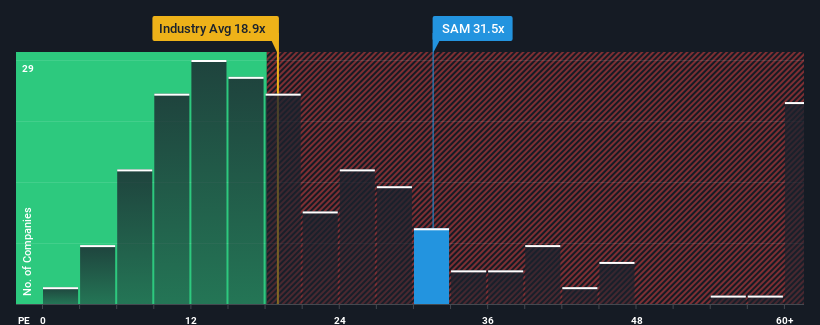- United States
- /
- Beverage
- /
- NYSE:SAM
The Boston Beer Company, Inc.'s (NYSE:SAM) Share Price Matching Investor Opinion

When close to half the companies in the United States have price-to-earnings ratios (or "P/E's") below 17x, you may consider The Boston Beer Company, Inc. (NYSE:SAM) as a stock to avoid entirely with its 31.5x P/E ratio. Although, it's not wise to just take the P/E at face value as there may be an explanation why it's so lofty.
Boston Beer Company certainly has been doing a good job lately as its earnings growth has been positive while most other companies have been seeing their earnings go backwards. The P/E is probably high because investors think the company will continue to navigate the broader market headwinds better than most. You'd really hope so, otherwise you're paying a pretty hefty price for no particular reason.
See our latest analysis for Boston Beer Company

What Are Growth Metrics Telling Us About The High P/E?
In order to justify its P/E ratio, Boston Beer Company would need to produce outstanding growth well in excess of the market.
Taking a look back first, we see that the company grew earnings per share by an impressive 64% last year. Despite this strong recent growth, it's still struggling to catch up as its three-year EPS frustratingly shrank by 58% overall. Accordingly, shareholders would have felt downbeat about the medium-term rates of earnings growth.
Shifting to the future, estimates from the analysts covering the company suggest earnings should grow by 25% per year over the next three years. That's shaping up to be materially higher than the 10.0% per annum growth forecast for the broader market.
In light of this, it's understandable that Boston Beer Company's P/E sits above the majority of other companies. Apparently shareholders aren't keen to offload something that is potentially eyeing a more prosperous future.
The Key Takeaway
Using the price-to-earnings ratio alone to determine if you should sell your stock isn't sensible, however it can be a practical guide to the company's future prospects.
As we suspected, our examination of Boston Beer Company's analyst forecasts revealed that its superior earnings outlook is contributing to its high P/E. At this stage investors feel the potential for a deterioration in earnings isn't great enough to justify a lower P/E ratio. Unless these conditions change, they will continue to provide strong support to the share price.
A lot of potential risks can sit within a company's balance sheet. Our free balance sheet analysis for Boston Beer Company with six simple checks will allow you to discover any risks that could be an issue.
If these risks are making you reconsider your opinion on Boston Beer Company, explore our interactive list of high quality stocks to get an idea of what else is out there.
Valuation is complex, but we're here to simplify it.
Discover if Boston Beer Company might be undervalued or overvalued with our detailed analysis, featuring fair value estimates, potential risks, dividends, insider trades, and its financial condition.
Access Free AnalysisHave feedback on this article? Concerned about the content? Get in touch with us directly. Alternatively, email editorial-team (at) simplywallst.com.
This article by Simply Wall St is general in nature. We provide commentary based on historical data and analyst forecasts only using an unbiased methodology and our articles are not intended to be financial advice. It does not constitute a recommendation to buy or sell any stock, and does not take account of your objectives, or your financial situation. We aim to bring you long-term focused analysis driven by fundamental data. Note that our analysis may not factor in the latest price-sensitive company announcements or qualitative material. Simply Wall St has no position in any stocks mentioned.
About NYSE:SAM
Boston Beer Company
Produces and sells alcohol beverages primarily in the United States.
Flawless balance sheet and fair value.
Similar Companies
Market Insights
Community Narratives




